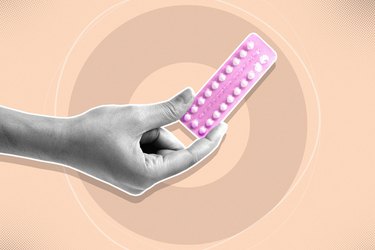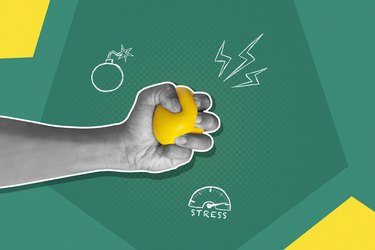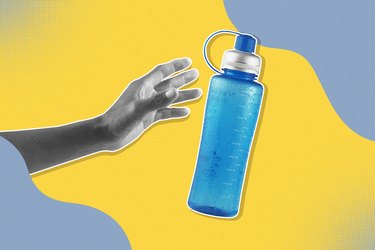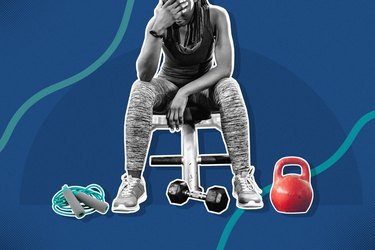
The side effects of starting hormonal birth control are pretty widely discussed. But there's a little more mystery about what happens to your body when stopping birth control.
Birth control pills, also known as oral contraceptive pills, are the second most common type of contraceptive method as of 2019 (the latest data available), per the Centers for Disease Control and Prevention (CDC). If you've been thinking about stopping birth control after being on the pill for years, you should know that it's safe to stop at any time, according to the Mayo Clinic. But you should expect your body to go through some changes.
Video of the Day
Video of the Day
Here's the scoop on the side effects of stopping birth control pills and tips for taking care of yourself as you make the transition.
When to Stop Birth Control Pills
There are several reasons why someone might want to stop using birth control pills. According to Felice Gersh, MD, ob-gyn and the founder/director of Integrative Medical Group of Irvine, those reasons include:
- Planning a pregnancy
- Experiencing adverse side effects like depression, blood clots, chronic vaginal infections and low libido
- Having trouble remembering to take them (and opting for a different birth control method)
Your Period Could Become Irregular
While some people who menstruate go back to their normal periods soon after stopping birth control pills, other people may have irregular periods for a while.
"Even if ovulation resumes during the first cycle post-pill, there's no guarantee the next few cycles will be regular. In fact, it can take up to a year for their cycles to go back to regular," says Kerry-Anne Perkins, DO, ob-gyn and member of the medical review board of Women's Health Interactive. "This is true for both types of pills, progesterone or estrogen-free and combined hormonal, which has both estrogen and progesterone."
And if you took birth control in order to regulate your menstrual cycle, there's a chance that previous unpleasant period-related symptoms may make a return, she notes.
You may also notice a change in the flow and duration of your period, per the Cleveland Clinic. It may be longer and heavier — birth control pills typically give you shorter and lighter periods.
Your Fertility Levels Could Be Lower
It's valid to have concerns about how your fertility may be affected by discontinuing birth control pills, especially if you are trying to become pregnant.
A July 2018 meta-analysis in Contraception and Reproductive Medicine found stopping contraceptive use doesn't significantly delay or negatively affect fertility.
But your fertility levels may also be lower than they were when you started taking birth control pills. "If you have been on birth control for many years, your fertility has naturally declined and may be significantly lower than when you started the birth control," Dr. Perkins says.
Tip
When stopping the pill, be sure to use a backup method of contraception if you aren't looking to get pregnant at all or right away, per the Cleveland Clinic.
You Could Lose or Gain Weight
The belief that oral contraceptives commonly cause you to gain weight is a longstanding one, per a January 2014 study in the Journal of Women's Health.
But researchers of the study found birth control pills weren't linked to short-term changes in weight or body composition after observing 150 people assigned female at birth (AFAB) with both normal weight and obesity who used oral contraception over three to four months.
Typically, the pill doesn't cause more than a pound of weight gain per year, according to the Cleveland Clinic.
There are chances that you can lose or gain weight after you stop taking the pill, though. "Some women retain water while on the pill, so if this is you, you may drop a couple of pounds after quitting it," Dr. Perkins says. "Others could retain water after quitting the pill, due to some temporary hormonal imbalances. Again, it shouldn't be more than a couple of pounds."
It's also possible to experience changes in appetite due to hormonal shifts, Perkins notes, that could in turn contribute to weight changes.
When to Talk to Your Doctor
Talk to your doctor if you have questions or concerns about what to expect when stopping birth control pills, per the Cleveland Clinic. That's also a good time to discuss how being off of the pill will affect any prior conditions you have.
You May Have Acne or Hair Loss
You have hormonal changes to thank for any adverse skin and hair-related side effects you may experience after you come off birth control pills. Quitting birth control pills leads to a temporary hormonal imbalance, according to Dr. Perkins.
"For example, acne is fairly common in the first few months post-pill," she says. Experiencing hair loss or a condition called hirsutism (excessive facial hair) is also possible.
You Might Experience Mood Shifts
Most people won't experience significant emotional changes related to stopping the pill; most of the effects are physical, per Jefferson Health. But if you experienced mood swings or emotional instability on birth control, those things may stop post-pill.
On the flip side, if you were prone to depression, anxiety and mood swings before using birth control pills, those conditions may return when you nix oral contraception, according to Oschner Health.
Your Sex Drive May Change
A September 2012 review in The Journal of Sexual Medicine found a small correlation between the use of hormonal contraceptives and decreased libido, however research shows there are mixed results overall on how hormonal birth control affects your sex drive.
If you experienced lower desire while on the pill, you could find yourself feeling more sexual than usual after you stop taking it. "After quitting the pill, you may also experience changes in your libido — usually higher libido, especially around ovulation," Dr. Perkins says.
Stopping Other Types of Hormonal Birth Control
Here are some potential side effects of stopping other types of hormonal birth control, according to Dr. Perkins:
- Birth control patches (i.e. Xulane) and rings (Nuvaring, Annovera): These will have similar effects as stopping the pill.
- Depo-Provera injection: A person may not ovulate for months or even years after the last shot. And while this shot can cause significant weight gain, progesterone-related weight gain should stop after you are no longer getting the shot. Being physically active and eating a nutritious diet can help if you are looking to lose weight after quitting Depo-Provera injections.
- Long-acting hormonal birth control, such as an IUD or the implant (Nexplanon): These have fewer side effects when discontinued and a fairly quick return to fertility. The hormone-free IUD, Paragard, does not have hormonal effects on your body. Therefore, when you remove it, you will experience no side effects, no delayed return to your fertility and no systemic changes.
Tips to Help Make Stopping the Pill Easier
Many of the side effects of discontinuing your birth control pill are temporary, but there are things you can do to help ease them.
1. Take a High-Quality Multivitamin
A September 2016 study in The Journal of Clinical Endocrinology and Metabolism found an association between higher vitamin D levels and estrogen-containing contraceptive use among more than 1,600 people identified in the study as African American women.
It may be beneficial to focus on naturally increasing your nutrient levels after you're off the pill. Some ways to raise your vitamin D levels, per the Mayo Clinic, include:
- Getting 15 minutes of sun exposure per day between the hours of 10 a.m. and 3 p.m.
- Eating foods that have been fortified with vitamin D, like certain milks and cereals
- Eating fatty fish like salmon, tuna and mackerel
Dr. Gersh also recommends supplementing if you can't fit enough crucial nutrients from your diet alone. "Taking a high-quality multivitamin is key. Be sure it contains methyl B12, methyl folate, selenium and the usual array of vitamins," she says. "Extra magnesium would be of benefit, along with omega-3s and vitamin D."
2. Finish Out Your Current Pill Cycle
While you can quit the pill cold turkey, it may be best to finish out your current pill pack before stopping altogether.
You can expect to have your period within a few days after stopping the pill if you stop in the middle of the current pill cycle, according to the Cleveland Clinic.
Try to finish out your current round of pills, if possible, to avoid messing with your period.
3. Eat a Nutritious Diet
A balanced diet can help as you transition away from birth control pills. Eating well is especially important if your appetite is affected by stopping the pill. For example, you may experience cravings.
"Pay attention to those cravings and try to eat a healthy and balanced diet to minimize them, and you shouldn't have weight issues," Dr. Perkins says.
- Mayo Clinic: "Birth control pill FAQ: Benefits, risks and choices"
- Contraception and Reproductive Medicine: "Return of fertility after discontinuation of contraception: a systematic review and meta-analysis"
- Cleveland Clinic: "6 Things That Can Happen When You Stop Taking the Pill"
- Journal of Women's Health: "Weight and Body Composition Changes During Oral Contraceptive Use in Obese and Normal Weight Women"
- Jefferson Health: "5 Things to Know When You Quit the Pill"
- Ochsner Health: "Side Effects of Stopping Birth Control"
- NIEHS: "Vitamin D levels may drop when women stop using birth control"
- Mayo Clinic: "Mayo Clinic Q and A: Getting enough vitamin D"
- Cleveland Clinic: "Your Guide to Going Off of Birth Control"
- The Journal of Sexual Medicine: "The effects of hormonal contraceptives on female sexuality: a review"
- The Journal of Clinical Endocrinology and Metabolism: "Use of Estrogen-Containing Contraception Is Associated With Increased Concentrations of 25-Hydroxy Vitamin D"
Is this an emergency? If you are experiencing serious medical symptoms, please see the National Library of Medicine’s list of signs you need emergency medical attention or call 911.



